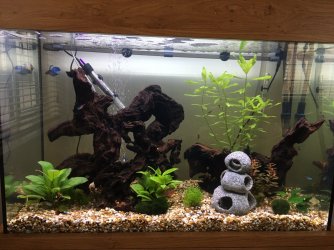O
On_a_dishy
Guest
So I ordered a male betta, and the online store sent the wrong one out and are brilliantly going to send the right one out.
This means that I have a betta that I hadn't planned for and have no tank for (the 'right' betta - my daughter's first fish - will have its own 34l tank).
I have tentatively put the 'wrong' betta into the community tank, expecting the male gourami to have a nip like he had with another betta I tried in there out of curiosity.
Nothing! No nipping, no hero-worshipping, no following... can I expect this peace to stay?
It's a 145l tank with 4 guppies, 4 tetras, 2 dwarf gouramis, 6 corys and 3 balloon mollies in. In the photo you can see the 'wrong' betta exploring in the top left of the image.
This means that I have a betta that I hadn't planned for and have no tank for (the 'right' betta - my daughter's first fish - will have its own 34l tank).
I have tentatively put the 'wrong' betta into the community tank, expecting the male gourami to have a nip like he had with another betta I tried in there out of curiosity.
Nothing! No nipping, no hero-worshipping, no following... can I expect this peace to stay?
It's a 145l tank with 4 guppies, 4 tetras, 2 dwarf gouramis, 6 corys and 3 balloon mollies in. In the photo you can see the 'wrong' betta exploring in the top left of the image.


